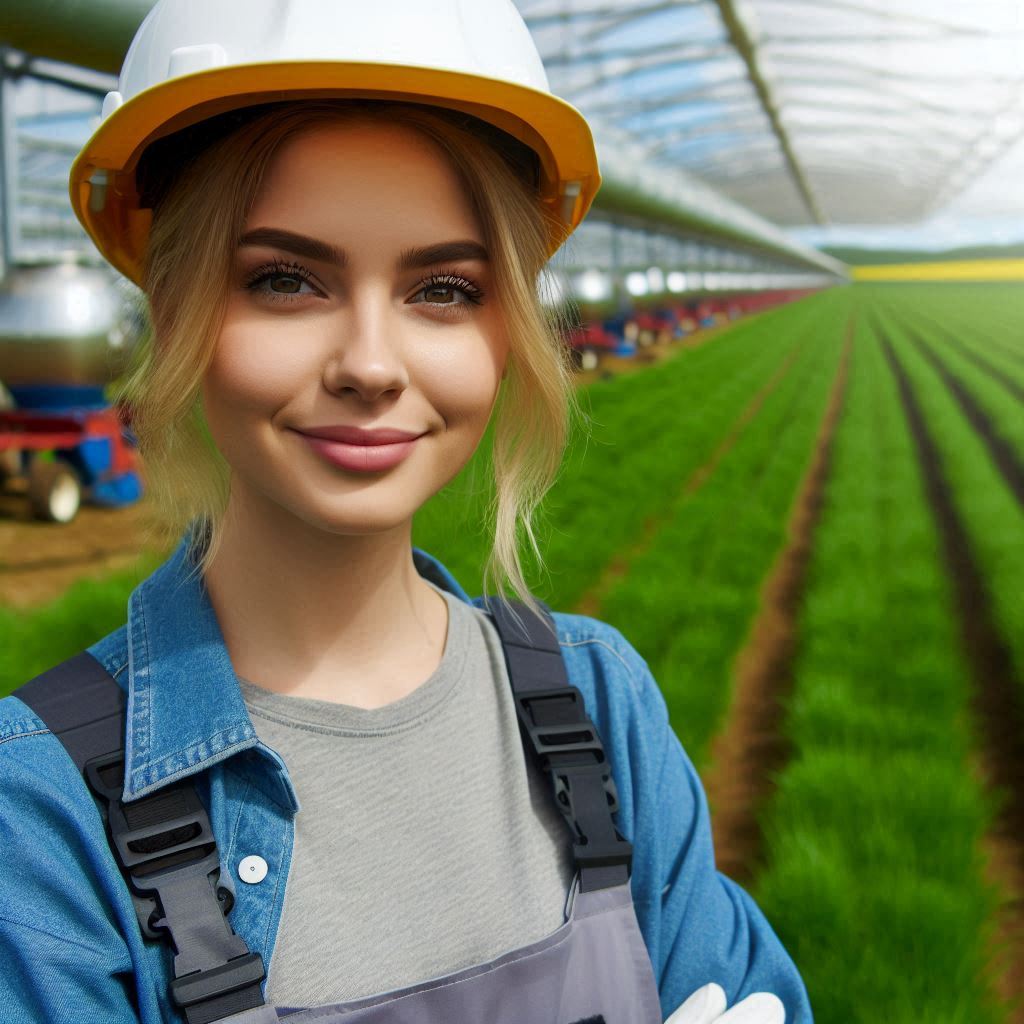Introduction
Agricultural engineers play a crucial role in the implementation and advancement of precision agriculture in modern farming practices.
Precision agriculture involves using technology to optimize crop yields while minimizing resources.
Agricultural engineers are essential in designing, developing, and implementing the various technologies and systems required for precision agriculture.
Their role is multifaceted, ranging from the design of automated machinery for planting and harvesting to the development of sensors and GPS technology for monitoring and controlling crop growth.
Key Responsibilities of Agricultural Engineers in Precision Agriculture
Technology Integration
Agricultural engineers are responsible for integrating various technologies such as drones, satellite imagery, and data analytics into farming operations.
They design and implement systems that collect and analyze data to make informed decisions about crop management.
Equipment Development
Agricultural engineers design and develop advanced farming equipment that is equipped with the latest technology to improve efficiency and productivity.
This includes precision planters, pesticide applicators, and irrigation systems that can be controlled remotely.
Data Analysis
Agricultural engineers analyze data collected from sensors and other monitoring devices to optimize crop management practices.
They use this information to make real-time adjustments to irrigation, fertilization, and pest control strategies.
Environmental Sustainability
Agricultural engineers play a vital role in promoting sustainable farming practices by developing technologies that minimize environmental impact.
They focus on reducing water usage, minimizing chemical inputs, and improving soil health through precision agriculture techniques.
Agricultural engineers are instrumental in driving the adoption of precision agriculture to improve crop yields, reduce resource wastage, and promote sustainable farming practices.
Their expertise and innovative solutions are essential for the future of agriculture.
Definition and Scope of Precision Agriculture
Define Precision Agriculture And Highlight Its Use Of Technology For Efficient Farming
Precision agriculture, also known as precision farming, represents a revolutionary approach to agriculture.
It employs advanced technology to boost farming efficiency.
This method targets specific areas within a field to optimize resource use.
Precision agriculture aims to maximize crop yields while minimizing waste and environmental impact.
Technology plays a pivotal role in this process, utilizing GPS systems, sensors, and data analytics to enhance farming practices.
GPS technology enables precise location tracking within fields, allowing farmers to focus on specific zones.
Sensors, whether mounted on machinery or embedded in the soil, gather real-time data on various factors such as soil moisture and crop health.
This data is crucial for making informed decisions.
Data analytics processes this information, helping farmers determine the exact needs of different field areas.
By applying targeted amounts of water, nutrients, and pesticides, farmers achieve greater efficiency and productivity.
The Scope of Precision Agriculture in Terms of Data Collection, Analysis, and Implementation
The scope of precision agriculture encompasses three main areas: data collection, analysis, and implementation.
Data Collection
Is the first critical step.
Farmers gather information using sensors, satellite imagery, and drones.
Sensors measure soil moisture, nutrient levels, and crop health.
Satellite imagery and drones provide additional data on crop growth and field conditions.
This comprehensive data collection helps in understanding the specific needs of each field area.
Analysis
Involves interpreting the collected data using advanced software and algorithms.
This step identifies patterns and trends that influence farming decisions.
For example, data analysis can reveal which sections of a field require more water or nutrients.
By understanding these patterns, farmers can make precise adjustments to their farming practices.
Implementation
is the final stage, where insights from data analysis are put into action.
Variable rate technology (VRT) adjusts the application of seeds, fertilizers, and pesticides based on the analyzed data.
This targeted approach ensures that each field area receives the optimal amount of resources.
Consequently, farmers reduce waste and enhance crop growth.
Basically, precision agriculture redefines modern farming by integrating technology into every aspect of the process.
It involves precise data collection, thorough analysis, and effective implementation.
This approach transforms traditional farming into a more accurate and efficient practice, ultimately leading to increased yields and reduced environmental impact.
Importance of Agricultural Engineers in Precision Agriculture
The Crucial Role of Agricultural Engineers in Designing and Implementing Precision Agriculture Systems
Agricultural engineers play an essential role in the success of precision agriculture.
They are responsible for designing and implementing sophisticated systems that significantly enhance farming efficiency and sustainability.
These engineers harness advanced technology to create systems that make farming practices more precise and targeted.
By integrating technologies such as GPS, sensors, and data analytics, they develop equipment that can make real-time decisions about planting, watering, and fertilizing crops.
The precision brought by these systems allows farmers to apply resources exactly where they are needed, thereby minimizing waste.
For instance, precision irrigation systems, designed by agricultural engineers, use data from soil moisture sensors to deliver water precisely to the plant roots.
This not only conserves water but also improves crop yield by ensuring that plants receive the optimal amount of moisture.
Similarly, precision fertilization systems apply nutrients in specific quantities and locations, enhancing soil health and reducing environmental impact.
Implementing these systems requires a deep understanding of both technology and agriculture.
Agricultural engineers must tailor their designs to fit the specific needs of different crops and farming environments.
They work closely with farmers to ensure that their systems address real-world challenges and enhance farming practices effectively.
This involves testing and modifying designs to suit diverse soil types, crop varieties, and climatic conditions.
The Skills and Expertise Required of Agricultural Engineers in This Field
To excel in precision agriculture, agricultural engineers must possess a diverse set of skills and expertise.
Proficiency in mechanical and electrical engineering is fundamental, as these engineers design and develop complex machinery and electronic systems.
They also need a strong foundation in computer science to manage data analysis, software integration, and system automation.
Knowledge in agronomy is crucial, providing a deep understanding of plant biology, soil management, and crop production techniques.
This expertise allows agricultural engineers to design systems that align with agricultural practices and optimize plant growth.
Additionally, familiarity with environmental science helps engineers create systems that promote sustainable farming and reduce the ecological footprint of agricultural activities.
Effective communication skills are also vital for agricultural engineers.
They must convey complex technical information to farmers in an understandable and practical manner.
Building trust and collaborating with farmers are essential for successful system implementation.
Engineers often provide training and support to ensure that farmers can effectively use and maintain the technology.
Moreover, agricultural engineers must stay current with technological advancements and industry trends.
Continuous learning and adaptation are necessary to address emerging challenges and capitalize on new opportunities in precision agriculture.
This proactive approach enables them to refine existing systems and innovate new solutions that meet the evolving needs of the agricultural sector.
Importance of Agricultural Engineers in Precision Agriculture
The importance of agricultural engineers in precision agriculture cannot be overstated.
They are at the forefront of integrating technology with farming practices to drive progress and innovation.
Their work is crucial in developing and implementing systems that improve farm productivity, resource efficiency, and environmental sustainability.
By bridging the gap between technology and practical farming needs, agricultural engineers enable farmers to adopt precision agriculture techniques that optimize their operations.
Their expertise in designing and implementing advanced systems ensures that farming practices are both effective and adaptable to varying conditions.
As precision agriculture continues to evolve, agricultural engineers will remain key contributors to the advancement of modern agriculture, helping farmers achieve greater efficiency.
Sustainability, and success systems, coupled with their technical skills and expertise, is vital in driving the adoption of precision agriculture practices.
As technology continues to advance, the demand for skilled agricultural engineers in this field is only expected to grow.
It is clear that their contribution is essential in shaping the future of sustainable and efficient agriculture.
Read: 5 Essential Software Tools Every US Architect Uses.
Tasks and Responsibilities of Agricultural Engineers in Precision Agriculture
Specific Tasks That Agricultural Engineers Perform In Precision Agriculture
In precision agriculture, agricultural engineers play a crucial role in designing machinery, systems, and sensors tailored specifically for the needs of modern farming practices.
Designing Machinery
Agricultural engineers design and develop innovative machines that are equipped with advanced technologies to optimize farm operations.
They create efficient equipment that can perform tasks such as planting, irrigation, fertilization, and harvesting with precision.
Developing Systems
In precision agriculture, systems integration is key to maximizing efficiency and productivity on the farm.
Agricultural engineers work on developing integrated systems that can collect, analyze, and interpret data from various sources to make informed decisions.
Transform Your Career Today
Unlock a personalized career strategy that drives real results. Get tailored advice and a roadmap designed just for you.
Start NowSensor Design
Agricultural engineers design sensors that can monitor soil health, crop growth, weather conditions, and other factors that impact agriculture.
These sensors provide real-time data to farmers, enabling them to make timely decisions for better crop management.
Discuss their involvement in data analysis, decision-making, and problem-solving
Data Analysis
Agricultural engineers are responsible for analyzing the vast amount of data collected from sensors, drones, satellites, and other sources.
They use data analytics tools to extract valuable insights that help farmers optimize their operations and maximize yields.
Decision-Making
Based on the data analysis, agricultural engineers assist farmers in making data-driven decisions related to planting, irrigation, pest control, and fertilization.
Their expertise helps farmers optimize resource utilization and reduce environmental impact.
Problem-Solving
Agricultural engineers are problem-solvers who identify challenges faced by farmers and develop innovative solutions to address them.
Whether it’s improving crop yield, reducing water usage, or enhancing sustainability, they strive to find practical and effective solutions for agricultural issues.
Overall, agricultural engineers in precision agriculture play a multifaceted role in designing, developing, and implementing technologies that revolutionize modern farming practices.
Their expertise in machinery design, system integration, sensor technology, data analysis, decision-making, and problem-solving is crucial for the success of precision agriculture in ensuring sustainable food production for a growing global population.
Read: Comparison: Architecture Styles across American Regions.
Use of Technology in Precision Agriculture
When it comes to precision agriculture, agricultural engineers play a crucial role in utilizing technological tools and advancements to optimize crop production, resource utilization, and environmental sustainability.
Let’s delve into the various technologies that agricultural engineers leverage in precision agriculture:
GPS Technology
Global Positioning System (GPS) technology is widely used by agricultural engineers in precision agriculture. GPS allows farmers to precisely map fields, track equipment, and monitor crops.
With accurate location data, farmers can optimize planting patterns, apply fertilizers and pesticides more efficiently, and reduce waste.
By integrating GPS technology into farming operations, agricultural engineers can increase productivity and yield while minimizing environmental impact.
Drones
Drones have revolutionized the way agricultural engineers monitor and manage crops.
These unmanned aerial vehicles can capture high-resolution images of fields, providing valuable insights into crop health, soil moisture levels, and pest infestations.
By analyzing drone data, agricultural engineers can identify problem areas, implement targeted interventions, and make informed decisions to improve crop yield.
Drones also enable farmers to survey large fields quickly and cost-effectively, saving time and resources.
Sensors
Sensors play a crucial role in precision agriculture by collecting real-time data on various crop parameters, such as temperature, humidity, and nutrient levels.
Agricultural engineers use sensors to monitor soil conditions, detect changes in plant health, and optimize irrigation practices.
By analyzing sensor data, farmers can adjust cultivation practices, apply inputs judiciously, and minimize environmental impact.
Sensors also help agricultural engineers predict crop yield, detect anomalies early, and ensure optimal crop growth throughout the season.
Overall, the use of technology in precision agriculture empowers agricultural engineers to make data-driven decisions, enhance crop production, and promote sustainable farming practices.
By leveraging GPS technology, drones, and sensors, agricultural engineers can optimize resource utilization, minimize environmental impact, and ensure food security for future generations.
Read: Exploring Architect Salary Trends: USA Analysis.

Benefits of Precision Agriculture in Farming
Enumerate the Advantages of Precision Agriculture for Farmers, Including Increased Productivity, Cost Savings, and Sustainability
Precision agriculture revolutionizes modern farming by leveraging advanced technology to maximize efficiency and productivity.
Farmers witness significant improvements in their operations through various benefits.
First, precision agriculture boosts productivity.
Advanced technologies, such as GPS and remote sensing, enable farmers to monitor crops in real time.
This constant oversight allows them to apply precise amounts of water, fertilizers, and pesticides only where needed.
By targeting specific areas rather than applying inputs uniformly, farmers significantly enhance crop yields.
Second, precision agriculture leads to substantial cost savings.
With targeted applications, farmers reduce the use of costly resources.
They avoid over-application of fertilizers and pesticides, which minimizes waste and lowers expenses.
Additionally, precision technology helps in optimizing fuel usage, as equipment operates more efficiently.
Third, precision agriculture promotes sustainability.
By using technology to monitor soil health and crop conditions, farmers can make informed decisions.
This practice helps maintain soil quality and reduces the environmental impact.
Lower chemical use also decreases pollution and enhances the overall health of the ecosystem.
How Precision Agriculture Helps Address Challenges Like Water Scarcity, Soil Erosion, and Climate Change
Precision agriculture addresses critical challenges like water scarcity.
Technology allows farmers to apply water precisely, reducing excess runoff and conserving this vital resource.
Smart irrigation systems adapt to real-time weather conditions, ensuring efficient water use even during droughts.
Another challenge precision agriculture tackles is soil erosion.
By implementing precise planting and harvesting techniques, farmers protect the soil structure.
This careful management prevents erosion and maintains the land’s productivity for future use.
Climate change presents another obstacle that precision agriculture helps to mitigate.
Farmers use weather data and predictive models to plan and adjust their practices.
These insights help in adapting to changing climate conditions, ensuring that crops thrive despite environmental shifts.
In summary, precision agriculture offers numerous benefits.
It enhances productivity, reduces costs, and promotes sustainability.
By addressing challenges such as water scarcity, soil erosion, and climate change, precision agriculture proves to be a crucial tool for modern farming.
Through these advancements, farmers achieve more efficient and environmentally friendly practices, paving the way for a sustainable agricultural future.
Read: The Role of NCARB in US Architecture Licensing.
Challenges Faced by Agricultural Engineers in Precision Agriculture
The Obstacles and Limitations that Agricultural Engineers Encounter While Implementing Precision Agriculture Systems
Agricultural engineers face several obstacles when implementing precision agriculture systems.
One major challenge is data management.
The sheer volume of data collected can be overwhelming, complicating efforts to ensure accuracy and reliability.
Engineers must develop robust methods for data collection and analysis to address this issue.
Another limitation is the interoperability of technologies.
Precision agriculture depends on various devices and software systems working together seamlessly.
Unfortunately, not all technologies are compatible, which can disrupt the effectiveness of precision agriculture.
Engineers need to tackle these compatibility issues to ensure smooth integration.
Scalability is also a significant obstacle.
Precision agriculture systems often perform well on a small scale but encounter difficulties when scaled up.
Engineers must innovate to maintain system effectiveness as the size of the operation increases.
This requires advanced approaches to design and implementation.
The high cost of technology presents another limitation.
Many precision agriculture tools are expensive, making them less accessible to smaller farms.
Engineers are tasked with finding ways to reduce costs while maintaining the quality of these technologies.
The rapid advancement of technology can be a challenge as well.
Engineers must keep up with the latest innovations while ensuring that existing systems remain functional and relevant.
This continuous need for adaptation can be both time-consuming and costly.
Training and education are additional hurdles.
Farmers and agricultural workers need comprehensive training to effectively use precision agriculture tools.
Engineers often provide or facilitate this training, adding another layer of complexity to their role.
Environmental factors also impact precision agriculture systems.
Variables such as weather conditions and soil types can affect data accuracy and system performance.
Engineers must design solutions that account for these factors.
Issues Like Data Management, Interoperability of Technologies, and Scalability
Data management is a critical issue in precision agriculture.
Engineers must handle large volumes of data and ensure its accuracy and reliability.
Effective data management requires sophisticated collection and analysis tools.
Interoperability of technologies is another significant concern.
Precision agriculture relies on various systems and devices that must work together.
Incompatibility between technologies can impede their effectiveness.
Engineers need to address these issues to ensure seamless integration.
Scalability is a challenge that engineers must overcome to apply precision agriculture effectively on larger scales.
Many solutions are efficient on a small scale but face difficulties when expanded.
Engineers must innovate to ensure that systems remain effective as operations grow.
Overall, while precision agriculture offers numerous benefits, agricultural engineers must address challenges related to data management, technology interoperability, and scalability.
By tackling these issues, engineers can enhance the effectiveness and accessibility of precision agriculture, contributing to more sustainable and efficient farming practices.
Future Trends in Precision Agriculture and Agricultural Engineering
Predict Upcoming Trends and Innovations in Precision Agriculture, Such as Artificial Intelligence, Automation, and Robotics
As technology advances, precision agriculture is set to transform significantly.
Artificial intelligence (AI) will lead the way.
AI will enhance data analysis and decision-making in farming.
Machine learning algorithms will predict crop needs with greater accuracy.
Sensors and drones will provide real-time data on field conditions.
Automation will revolutionize farm machinery.
Autonomous tractors and harvesters will increase efficiency and reduce labor costs.
These machines will perform tasks with precision and speed.
Robotic systems will handle planting, weeding, and harvesting.
This will minimize human intervention and operational errors.
Robotics will become more sophisticated.
Robots will perform complex tasks in various weather conditions.
They will be designed to work with different crop types and field sizes.
This will enhance productivity and reduce manual labor.
Farmers will benefit from increased precision in every aspect of farming.
Speculate on the Role of Agricultural Engineers in Shaping the Future of Farming Through Technological Advancements
The integration of AI and robotics will drive new innovations.
Agricultural engineers will play a crucial role in developing these technologies.
They will design and test advanced systems to ensure reliability.
Engineers will collaborate with tech companies to integrate AI into farming equipment.
Data management will become more crucial.
Engineers will develop systems to handle vast amounts of data generated by sensors and drones.
They will create software to analyze and interpret this data effectively.
This will help farmers make informed decisions based on real-time information.
The use of big data will also increase.
Engineers will leverage big data analytics to optimize crop yields and resource use.
They will develop models to predict weather patterns and soil conditions.
This will aid in precise planning and execution of farming practices.
Sustainability will be a key focus.
Engineers will design technologies that minimize environmental impact.
They will work on systems that reduce water and fertilizer usage.
Precision agriculture will help achieve sustainable farming goals by improving resource efficiency.
As precision agriculture evolves, so will the role of agricultural engineers.
They will need to stay ahead of technological advancements.
Continuous learning and adaptation will be essential.
Engineers will drive innovations that shape the future of farming, making it more efficient, productive, and sustainable Future.
Showcase Your Business Today
Reach thousands of readers actively exploring professional services. Publish your business profile and grow your audience now.
Publish NowDelve into the Subject: How to Prepare for an IT Support Specialist Interview
See Related Content: How Biomedical Engineers Improve Patient Care
Conclusion
When it comes to precision agriculture, agricultural engineers play a crucial role in implementing technological solutions.
These professionals are responsible for designing and developing tools and equipment that optimize farming practices.
By utilizing sensors and automation technology, agricultural engineers help farmers make data-driven decisions.
They focus on maximizing crop yields, minimizing waste, and reducing the environmental impact of farming.
Agricultural engineers work closely with farmers to understand their specific needs and challenges.
They create tailored solutions that improve efficiency, productivity, and sustainability in agriculture.
From creating precision planting systems to developing drone technology for crop monitoring, their innovations drive progress.
Their expertise in robotics, GPS technology, and data analysis revolutionizes traditional farming methods.
Overall, agricultural engineers are instrumental in advancing precision agriculture and shaping the future of farming.
In the end, the role of agricultural engineers in precision agriculture is indispensable for sustainable and efficient farming practices.
Their contributions not only enhance productivity but also promote environmental stewardship and economic viability in agriculture.
[E-Books for Sale]
The Big Book of 500 High-Paying Jobs in America: Unlock Your Earning Potential
$19.99 • 500 High-Paying Jobs • 330 pages
Explore 500 high-paying jobs in America and learn how to boost your career, earn more, and achieve success!
See All 500 High-Paying Jobs of this E-Book
1001 Professions Without a Degree: High-Paying American Jobs You Can Start Now
$19.99 • 1001 Professions Without a Degree • 174 pages
Discover 1001 high-paying jobs without a degree! Unlock career tips, skills, and success strategies for just $19.99!




